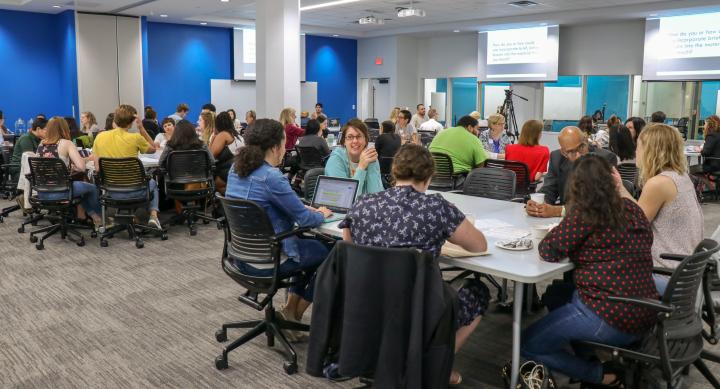On Friday, March 29th, over 60 faculty, staff, and graduate students from more than 30 departments and units on campus gathered to celebrate strong graduate student teaching at UT at the 2019 Graduate Student Showcase. The Showcase was presented by the Center for Teaching and Learning, in partnership with UT Libraries and the Graduate School. Now in its third year, Molly Hatcher, Director of the Center for Teaching and Learning, first conceived of the event as way to emphasize the significant role graduate students have in teaching undergraduate students and “advancing an energetic culture of teaching and learning at UT.” Hatcher explained, “the Showcase is an occasion for us to come together as a community and celebrate the amazing work of the graduate student instructors on our campus, and learn from some of the issues they’re grappling with in their teaching.”
At the Showcase, five graduate student instructors presented quick, compelling talks about their teaching and then posed a provocative question for attendees to discuss at their tables. This built-in time for discussion and reflection is intended as way for attendees to grapple with concepts and strategies that each of the presenters discuss. This year, presenters provided insightful, personal stories about their own teaching, which often involved bridging course content with current social and political realities, all while upholding a supportive classroom environment. Each of the presenters shared concrete, actionable teaching strategies that are transferrable to a diversity of classroom contexts. View all of the presentations here.
Active Learning in Cookbook Labs You Butter Believe It!: Matthew Landry (Department of Nutritional Sciences) discussed opportunities for active learning he has scaffolded into his “cookbook labs.” He shared strategies that could be implemented in that ranged from 30 seconds to 30+ minutes. By incorporating active learning strategies in his labs, he helped students acquire a more authentic sense of “doing” science and building self-directed learning skills.
Perspectives From an Undocumented Instructor: Challenging Narratives of Hatred and Discussing Immigration in the Spanish-language Classroom: Tania Lizeth García Piña (Spanish and Portuguese Department) talked about how her own identity as an undocumented instructor affected her experiences in her own classroom. She reflected on the greater significance of teaching Spanish in today’s classroom and the importance of building bridges between course content and cultural, social, and political aspects “outside” of the classroom.
They’re Just Gullible: Role-Playing Games, History, and Humble Analysis: David Rahimi (Department of History) explained how he taught social history through a role-playing game he developed about a nineteenth century election. His goal was for his students to build empathy with historical figures as well as arrive at a better sense of political motivation and behavior, past and present.
Difficult Conversations & The Urban OED: Maria Roxana Loza (Department of English) presented an interactive talk, demonstrating how a classroom activity built around critically examining uncomfortable, dehumanizing words could allow students to contextualize words or phrases while broadening their conceptions of what sources may be considered “valid” in scholarly work.
Champion Debaters, Silent Discussions: Facilitating Conversation on Controversial Topics in the Classroom: Augusta Dell’Omo (Department of History) shared how she utilized the critical conversations model to facilitate conversations of controversial topics in her classroom. She guided the audience in her process to build space for students’ identities while encouraging lively, intellectually rigorous debate.
The event ended with a call to showcase more of the good teaching graduate student instructors do in their classrooms and labs across campus. The Center for Teaching and Learning aims to draw further attention to the intellectual leadership graduate students are building in their current instructional roles by recording “Two-Minute Teaching Tips,” to be featured on their website. If you’re a graduate student who has an innovative instructional strategy or teaching tip you’d like to share, follow this link to complete a proposal!


